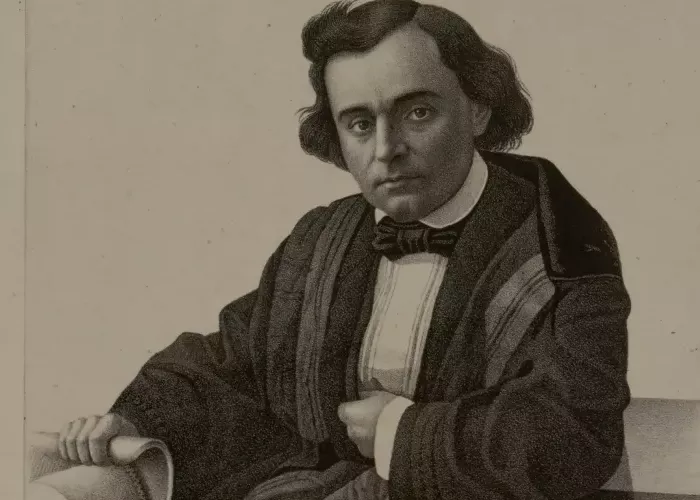Welcome to Poem of the Day – Nocturne by Nikolay Fyodorovich Shcherbina.
Nikolay Fyodorovich Shcherbina, a masterful poet of the 19th century, is celebrated for his ability to infuse his works with profound emotion and philosophical depth. Among his many compositions, Nocturne stands out as a masterpiece that weaves together the sublime elements of nature, introspection, and a yearning for transcendence. This essay delves into the thematic richness, stylistic brilliance, and emotional resonance of this poignant poem.
Nocturne Poem
In the fragrance of the spring night
I gaze into the wondrous sky,
And the sea, slumbering by night,
Is so beautiful, so peaceful and pleasurable.
And I feel the growing grass
As it drinks in night’s breath,
My heart calls to you,
My eyes see you in everything.
I seem to see your gaze in the stars,
And feel your breath in nature’s breath,
You are like the flowers that bloom in the night
And are everywhere present in the water and air.
When I hear the sounds of the evening,
Which flow and melt in the air,
And which mysteriously blend together
Disquiet, and peace, and the pleasure of pain,
It seems to me as if you were flying towards me
Invisibly, from afar,
As if I could feel you rushing past me,
Pouring into my heart, like fire.
Tell me what is it that is so intimately hidden
In this night and its sounds and with you,
And what chord is merged in these sounds
With my heart, and with my destiny?
Nocturne Poem Explanation
At its core, Nocturne explores the interplay between the outer world of nature and the inner realm of human emotion. The poem captures a moment of stillness and reflection, where the nocturnal atmosphere becomes a mirror for the poet’s contemplations on life, time, and the divine. The night, often a symbol of mystery and introspection, provides a backdrop for existential musings that are both personal and universal.
The poem is steeped in romantic ideals, particularly the reverence for nature as a source of inspiration and solace. Shcherbina’s night is not merely a setting; it is a living entity that communicates with the soul. Through vivid imagery and evocative language, he conveys the paradox of night as both a source of comfort and a reminder of life’s fleeting nature.
Stylistic Brilliance
Shcherbina’s mastery of form and rhythm is evident in Nocturne. The poem flows with a musicality that echoes the tranquility of the night, embodying its title. The use of a harmonious meter mirrors the gentle cadence of the evening’s sounds, drawing readers into an immersive experience.
His choice of language is both precise and evocative. Through metaphor and personification, the poet animates the natural world, imbuing it with a spirit that resonates with human emotion. For instance, the moon becomes a silent observer, casting its gaze upon the earth with a serenity that contrasts the turmoil within the poet’s heart. Similarly, the stars, distant yet constant, evoke feelings of awe and humility.
Shcherbina employs contrasts masterfully in Nocturne. The interplay between light and shadow, silence and sound, presence and absence, creates a dynamic tension that mirrors the dualities of existence. This dichotomy enriches the poem, inviting readers to explore the layers of meaning hidden within its lines.
Emotional Resonance
What sets Nocturne apart is its ability to evoke a profound emotional response. The poem speaks to the universal human experience of seeking connection—with oneself, with others, and with the cosmos. The night, in all its stillness, becomes a canvas for the poet’s introspection, revealing a vulnerability that resonates with readers.
The melancholic undertone of the poem reflects the poet’s awareness of life’s impermanence. Yet, amid this melancholy, there is a sense of quiet acceptance and even beauty. Shcherbina does not shy away from the inevitability of loss or the passage of time; instead, he embraces these truths as integral to the human experience.
Philosophical Undertones
Beyond its lyrical beauty, Nocturne is imbued with philosophical reflections that elevate it from a mere description of nature to a meditation on existence. The night serves as a metaphor for the unknown—the mysteries of life, death, and what lies beyond. Through his contemplation of the cosmos, Shcherbina invites readers to ponder their place within the vast expanse of time and space.
The poem also touches on the theme of transcendence. The stillness of the night is not only a moment of pause but also an opportunity to connect with something greater than oneself. This spiritual dimension adds depth to the poem, making it a work that continues to inspire and provoke thought.
Conclusion
Nocturne by Nikolay Fyodorovich Shcherbina is a timeless exploration of the human spirit’s relationship with nature, time, and the divine. Its thematic richness, stylistic brilliance, and emotional resonance make it a cornerstone of Shcherbina’s poetic legacy. Through the lens of a quiet night, the poet captures the essence of existence—its beauty, its fragility, and its infinite mystery. For readers, Nocturne is not just a poem to be read but an experience to be felt, a journey into the heart of what it means to be human.

